 KORONA MUSHROOM UNION,
KORONA MUSHROOM UNION,
HUNGARY
|
|
Hungary Centre: H-3396 Kerecsend, Pf. 8.
Phone: (36-36)550-500
Fax: (36-36)550-100
Email:info@koronagomba.hu
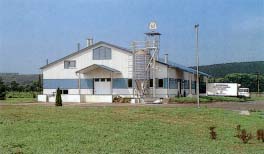 In
Hungary there are several descriptions of successful mushroom cultivation
from as early as the middle of the 19th century. This country was also among
the first spawn makers in Europe. In 1926 a spawn laboratory began to work
and was soon followed by two others. The excellent quality of Hungarian spawn
contributed to a large extent to Hungary becoming the third in Europe - after
France and England - with respect to the quantity of cultivated mushrooms
by the beginning of the forties. At that time, Hungarian spawn export was
important, particularly that going to Germany. The predecessor of the Korona
Mushroom Union started business ten years ago and has since developed from
a small enterprise into a large union containing several major firms and
a number of smaller enterprises. Presently, 'Korona' Inc. is a dominant factor
of the mushroom industry in Central and Eastern Europe. It has had a great
role in tripling of the national mushroom production since 1990: the quantity
reaches 25,000 tons in 1995. As to the output of cultivated mushrooms per
capita which is 2.5 kg yearly, Hungary has practically reached the present
average of Western Europe. 'Korona' covers the total range of mushroom industry
which is unique in this area of Europe. The modern KORONA-LE CHAMPION SPAWN
laboratory (Picture 1) has had its start recently and it employs a further
developed version of the original French technology which takes into
consideration the valuable heritage of the 70 years of Hungarian spawn making
tradition as well. The co-operation with the world famous Le Champion firm
ensures both the excellent technology and the high quality of spawns produced.
This new laboratory is able to produce 2 million litres of spawn yearly in
one shift. Since this quantity is larger than currently necessary in Hungary,
the surplus is being exported. In 1996 'Korona' organises its 7th International
Mushroom Day; while the only Hungarian mushroom growing journal, the Hungarian
Mushroom Review is also edited and published by Korona Mushroom Union.
In
Hungary there are several descriptions of successful mushroom cultivation
from as early as the middle of the 19th century. This country was also among
the first spawn makers in Europe. In 1926 a spawn laboratory began to work
and was soon followed by two others. The excellent quality of Hungarian spawn
contributed to a large extent to Hungary becoming the third in Europe - after
France and England - with respect to the quantity of cultivated mushrooms
by the beginning of the forties. At that time, Hungarian spawn export was
important, particularly that going to Germany. The predecessor of the Korona
Mushroom Union started business ten years ago and has since developed from
a small enterprise into a large union containing several major firms and
a number of smaller enterprises. Presently, 'Korona' Inc. is a dominant factor
of the mushroom industry in Central and Eastern Europe. It has had a great
role in tripling of the national mushroom production since 1990: the quantity
reaches 25,000 tons in 1995. As to the output of cultivated mushrooms per
capita which is 2.5 kg yearly, Hungary has practically reached the present
average of Western Europe. 'Korona' covers the total range of mushroom industry
which is unique in this area of Europe. The modern KORONA-LE CHAMPION SPAWN
laboratory (Picture 1) has had its start recently and it employs a further
developed version of the original French technology which takes into
consideration the valuable heritage of the 70 years of Hungarian spawn making
tradition as well. The co-operation with the world famous Le Champion firm
ensures both the excellent technology and the high quality of spawns produced.
This new laboratory is able to produce 2 million litres of spawn yearly in
one shift. Since this quantity is larger than currently necessary in Hungary,
the surplus is being exported. In 1996 'Korona' organises its 7th International
Mushroom Day; while the only Hungarian mushroom growing journal, the Hungarian
Mushroom Review is also edited and published by Korona Mushroom Union.
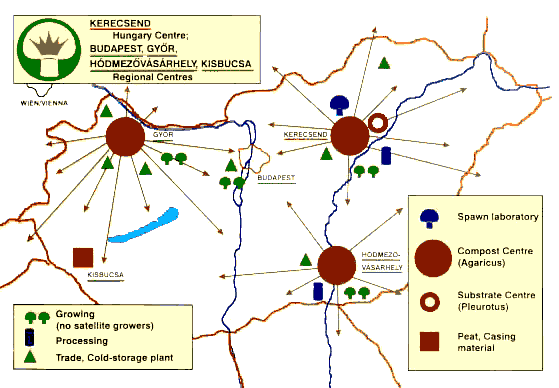
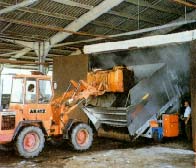
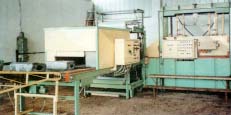 Within Korona Mushroom Union compost
production the tasks of Quality Champignons Ltd. fresh horse manure and wheat
straw are used as row materials. The composting procedure is carried out
in two phases; exclusively Dutch machines and computer systems (Fancom) are
used. This high-tech is characteristic of all the three compost centres.
Picture 2 shows how compost is filled into the peak heating tunnel. The compost
will be ready for growing in this special tunnel after pasteurisation and
conditioning. The spawn is mixed with the compost by machine. Then the mixture
is filled into plastic bags (Picture 3). Mushroom growing in bags has had
a 25-year tradition in Hungary. This is a very successful and popular method
whose greatest advantage is that it can be used in various places - like
caves, cellars or buildings, etc. -originally built for other purposes not
for mushroom growing. In one of the compost centres compost in pressed blocks
is also produced by a special line (Picture 4). This method, which is more
intensive than the one in bags and is particularly useful in the case of
the shelf system, has been introduced in Hungary by Quality Champignons
Ltd.
Within Korona Mushroom Union compost
production the tasks of Quality Champignons Ltd. fresh horse manure and wheat
straw are used as row materials. The composting procedure is carried out
in two phases; exclusively Dutch machines and computer systems (Fancom) are
used. This high-tech is characteristic of all the three compost centres.
Picture 2 shows how compost is filled into the peak heating tunnel. The compost
will be ready for growing in this special tunnel after pasteurisation and
conditioning. The spawn is mixed with the compost by machine. Then the mixture
is filled into plastic bags (Picture 3). Mushroom growing in bags has had
a 25-year tradition in Hungary. This is a very successful and popular method
whose greatest advantage is that it can be used in various places - like
caves, cellars or buildings, etc. -originally built for other purposes not
for mushroom growing. In one of the compost centres compost in pressed blocks
is also produced by a special line (Picture 4). This method, which is more
intensive than the one in bags and is particularly useful in the case of
the shelf system, has been introduced in Hungary by Quality Champignons
Ltd.
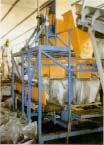 The 'Korona'
compost centres that are located in various parts of Hungary produce altogether
a maximum of 1,500 tons of spawned compost weekly. However, this maximum
capacity will be increased by roughly 10 percent in the near future. Besides,
a smaller capacity plant producing oyster mushroom substrate (max.100 tons
weekly) is also part of Korona Mushroom Union.
The 'Korona'
compost centres that are located in various parts of Hungary produce altogether
a maximum of 1,500 tons of spawned compost weekly. However, this maximum
capacity will be increased by roughly 10 percent in the near future. Besides,
a smaller capacity plant producing oyster mushroom substrate (max.100 tons
weekly) is also part of Korona Mushroom Union.
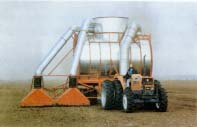 The compost is
delivered to the satellite growers in various parts of the country with a
lowered price by trucks. The number of 'Korona' satellite growers is close
to 300. There are several compost customers also in the neighbouring countries.
Our growing methods and system are studied particularly from developing
countries. According to the demands of individual growers - as an extra
possibility - supplement (imported from the USA and Holland) will be added
to the compost. The success of mushroom growing is to a great extent based
on the quality and thickness of the casing material. In order to be able
to supply the growers with this very important basic material, a new venture
has recently been started in Zala county for the purposes of having access
to the best peat-bogs of the country (Picture 5) and of producing the casing
material. The special peat-mixture that is suitable for direct application
as casing material is produced in 80 litres closed plastic bags.
The compost is
delivered to the satellite growers in various parts of the country with a
lowered price by trucks. The number of 'Korona' satellite growers is close
to 300. There are several compost customers also in the neighbouring countries.
Our growing methods and system are studied particularly from developing
countries. According to the demands of individual growers - as an extra
possibility - supplement (imported from the USA and Holland) will be added
to the compost. The success of mushroom growing is to a great extent based
on the quality and thickness of the casing material. In order to be able
to supply the growers with this very important basic material, a new venture
has recently been started in Zala county for the purposes of having access
to the best peat-bogs of the country (Picture 5) and of producing the casing
material. The special peat-mixture that is suitable for direct application
as casing material is produced in 80 litres closed plastic bags.
|
|
|
Some of the firms of 'Korona' cultivate mushrooms in large growing surfaces
which has been made increasingly possible by low budget plastic growing houses
(Picture 6). These special growing houses lead to a new development of mushroom
growing beside growing in caves which is the dominant method now in Hungary.
These plastic houses are suitable for the growing of Agaricus bisporus (Picture
7) and oyster mushrooms as well (Picture 8). The successful, simple and cheap
growing technologies of 'Korona' are recommended - and also the total system
is available -to foreigners interested in mushroom cultivation. Various types
and sizes of processed mushrooms, for example in jars (Picture 9), are available,
too. Beside the traditional 'sliced mushrooms' and 'closed caps' there is
a great success particularly abroad of the two new
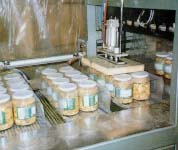 members of the
family of Korona products, one of them being 'Mushrooms in tomato sauce'
members of the
family of Korona products, one of them being 'Mushrooms in tomato sauce'
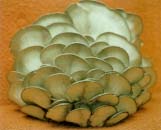 and the other
'Mushroom salad in Kerecsend style'. In addition to the export of spawn and
of mushroom products, that of fresh mushrooms is also of great importance
due to the activity of Trans Champignon Ltd. (Budapest) of 'Korona'.
and the other
'Mushroom salad in Kerecsend style'. In addition to the export of spawn and
of mushroom products, that of fresh mushrooms is also of great importance
due to the activity of Trans Champignon Ltd. (Budapest) of 'Korona'.
Our products are selling well and we can highly recommend them to you.
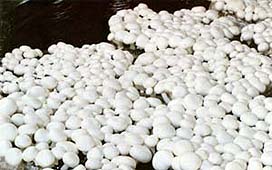
|
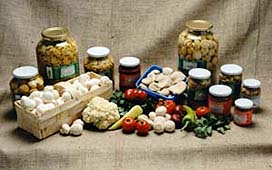
|
| Copyright © 1996-2000 AgriaComputer Kft. |
|